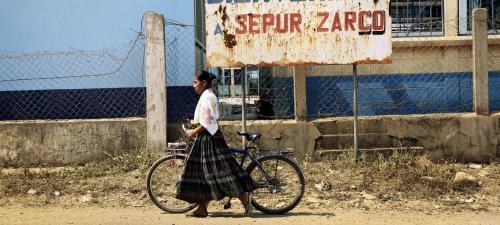New UN report reveals chronic bias against women over last decade
A new UN report launched on Monday revealed no improvement in the level of prejudice shown against women over the past decade, with almost nine out of 10 men and women worldwide, still holding such biases.

Indigenous women in Guatemala were systematically raped and enslaved by the military in a small outpost near the Sepur Zarco community during the 36-year-long civil conflict.
“Half of people worldwide still believe men make better political leaders than women, and more than 40 per cent believe men make better business executives than women,” according to the UN Development Programme (UNDP) in its latest Gender Social Norms Index (GSNI) report.
“Social norms that impair women’s rights are detrimental to society more broadly, dampening the expansion of human development,” said Pedro Conceição, head of UNDP’s Human Development Report Office.
The more things change
A staggering 25 per cent of people believe it is justified for a man to beat his wife, according to the report, reflecting the latest data from the World Values Survey.
The report argues that these biases drive hurdles faced by women, manifested in a dismantling of women’s rights in many parts of the world with movements against gender equality gaining traction and, in some countries, a surge of human rights violations.
Biases are also reflected in the severe underrepresentation of women in leadership. On average, the share of women as heads of State or heads of government has remained around 10 per cent since 1995 and in the labour market women occupy less than a third of managerial positions.
Broken links in progress
The report also sheds light on a broken link between women’s progress in education and economic empowerment. Women are more skilled and educated than ever before, yet even in the 59 countries where women are now more educated than men, the average gender income gap remains a 39 per cent in favour of men.
“Lack of progress on gender social norms is unfolding against a human development crisis,” Mr. Conceição said, noting that the global Human Development Index (HDI) declined in 2020 for the first time on record and again the following year.
“Everyone stands to gain from ensuring freedom and agency for women,” he added.
Governments’ crucial role
The UNDP report emphasized that governments have a crucial role in shifting gender social norms, from adopting parental leave policies, that have changed perceptions around care work responsibilities, to labour market reforms that have led to a change in beliefs around women in the workforce.
“An important place to start is recognizing the economic value of unpaid care work,” said Raquel Lagunas, Director of UNDP’s gender team.
“This can be a very effective way of challenging gender norms around how care work is viewed. In countries with the highest levels of gender biases against women, it is estimated that women spend over six times as much time as men on unpaid care work.”
Change can happen
The report emphasized that despite the continued prevalence of bias against women, the data shows change can happen.
An increase in the share of people with no bias in any indicator was evident in 27 of the 38 countries surveyed. The report authors said that to drive change towards greater gender equality, the focus needs to be on expanding human development through investment, insurance, and innovation.
This includes investing in laws and policy measures that promote women’s equality in political participation, scaling up insurance mechanisms, such as strengthening social protection and care systems, and encouraging innovative interventions that could be particularly effective in challenging harmful social norms, patriarchal attitudes, and gender stereotypes.
For example, combatting online hate speech and gender disinformation can help to shift pervasive gender norms towards greater acceptance and equality, according to the report.
The report recommended directly addressing social norms through education to change people’s views, policies and legal changes that recognize the rights of women in all spheres of life, and more representation in decision-making and political processes.
Source:UN
- 138 reads
Human Rights
Ringing FOWPAL’s Peace Bell for the World:Nobel Peace Prize Laureates’ Visions and Actions

Protecting the World’s Cultural Diversity for a Sustainable Future

The Peace Bell Resonates at the 27th Eurasian Economic Summit

Declaration of World Day of the Power of Hope Endorsed by People in 158 Nations

Puppet Show I International Friendship Day 2020

